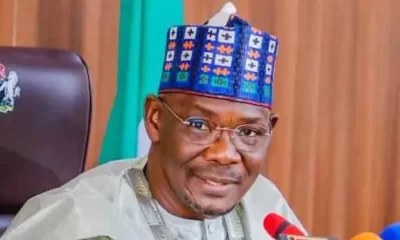NEWS
Police Apprehends Two Arms Manufacturers, Four Others in Benue

From Attah Ede, Makurdi
The Benue State Police Command on Tuesday arrested over six suspects for sundry criminal activities including illegal arms manufacturing, armed robbery and recovered arms.The Commissioner of Police in the state, Hassan Yabanet disclosed this in a press statement on Tuesday in Makurdi.
The Commissioner stated that after enjoying a peaceful Christmas and New Year celebration, the command decided to maintain a peaceful atmosphere by going after the criminals in their hideouts. He said in some operations carried out in the last one week, the command arrested six suspects among them, two suspected gun manufacturers at Kwande Local Government Area LGA, of the state. He said “Following credible information gathered about criminals manufacturing arms at Mbaafa, Adikpo, Kwande LGA, a team of detectives were deployed to investigate the case.”On 11/1/2025 at about 1430hrs, police stormed the said factory at Mbaafa and arrested one Friday Aduduakamve and Iorwashima Iornyume AKA “AK-35” all ‘m’ of the same address. On the spot search of the factory led to the recovery of nine fabricated pistols, one yet to be completed AK-47 rifle, two gas cylinders, one filing machine, four other machines and many other tools for fabricating rifles.”The Commissioner also said the operatives arrested another suspected gun manufacturer at Daudu, Guma LGA of the state.”As police detectives began intelligence gathering on criminal activities in Daudu, information was received that one Meme Ihoon ‘m’ 50yrs was responsible for all short arms being used by kidnappers, armed robbers and cultists in Daudu.”During investigation, the said suspect was arrested on 10/1/2025 at about 0800 hours and six dane guns and three long pipes used for fabricating guns were recovered from his house. The suspect confessed to having been producing and selling arms. Investigation is ongoing to arrest other criminals connected with the case.The command also arrested suspects for mischief and armed robbery. “On 05/01/2025 at about 130hrs three brothers embarked on a journey to Kwande for their personal business. They boarded a motorcycle from Obudu LGA of Cross River State to Adikpo but the cyclist decided to divert to a different destination and called his gang members to rob them unknowing to him that one of them understood the language in which he spoke.”He explained to his brothers that the cyclist was planning evil against them so they ran away. The cyclist and his cohorts still chased them to the bush and robbed them of the French currency (CFA franc) and naira they had.”They also lynched one of the victims, one sustained grievous injuries while the other escaped. Two perpetrators, one Terhemba Abugh ‘m’ and Shima Terseer ‘m’ of the same address were arrested.”He said an investigation is ongoing to arrest other suspects involved in this barbaric act. Also, “Following an armed robbery incident reported on the 12/01/2025 at about 2150hrs, Police Patrol team within the area moved swiftly and arrested one Aondoseer Nguetar ‘m’ of Agan North Bank Makurdi, Who confessed to the crime.He also stated that investigation is ongoing to arrest other suspects at large.The CP called on parents, religious leaders and traditional rulers to join the Police in the fight against criminality as there is need to continue to train young people on cultural and religious values saying it will help check the excesses witnessed currently.NEWS
Wike Vows to Build More Houses for Judges

By Laide Akinboade, Abuja
The Federal Capital Territory (FCT) Minister, Nyesom Wike on Monday reiterated that President Bola Tinubu, will continue to support the judiciary to enhance productivity, reduce delays, and uphold the independence and integrity of the judiciary.
The Minister disclosed that budgetary provisions had been made to construct additional residential houses for FCT High Court Judges to mitigate housing shortages and ensure all judicial officers are appropriately accommodated.
Wike, in his goodwill message at the Special Court session formally marking the commencement of the 2025/2026 Legal Year of the Court of Appeal in Abuja, on Monday, said “well-equipped court facilities, chambers, and support infrastructure ensure that judicial work is conducted in a professional, safe, and conducive environment.
”He disclosed that “under the President’s decisive action, the Federal Capital Territory Administration (FCTA) has formally handed over the Certificate of Occupancy for the Supreme Court’s land and commenced the full perimeter fencing of the entire complex to safeguard the nation’s apex court against encroachment and security breaches. This swift, long-awaited intervention gives the Apex Court of our beloved country the much-needed Confidence Building which had not been done in past administrations. This confidence building actions trickles down to each arm of the judiciary.”
The Minister also listed various interventions and supports of the President for the judiciary through the FCTA to include; the ongoing construction of secure and befitting residential quarters for Heads of Courts within the FCT and ongoing construction of a new Magistrate Court Complex in Jabi District to expand access to justice for FCT residents and reduce the burden on existing court infrastructure.
Others are construction of Staff Quarters for the Nigerian Law School in the FCT and design and construction of the Court of Appeal Abuja division Complex as well as residences of the Justices of the National Industrial High Court Abuja Division and Federal High Court Abuja Division.
He stated that the projects were designed to directly support judges in the performance of their duties, saying that “The reasoning of President Bola Tinubu’s administration is that providing comfortable and secure accommodation allows judges to focus entirely on the timely and efficient administration of justice, free from the distractions of inadequate living conditions.”
Reiterating the continued support of the FCTA to the implementation of justice reforms, Wike said; “As we step into the new Legal Year, the FCT Administration remains resolute in its determination to further support the implementation of justice reforms. Our priorities for the 2025/2026 Legal Year are focused on consolidating the gains made and expanding support where it is most needed.
“We will aggressively push for the timely completion of the new residential quarters for Heads of Courts and the Jabi Magistrate Court Complex to ensure prompt utilization.
“Furthermore, we have made budgetary provisions to construct additional residential houses for FCT High Court Judges to mitigate housing shortages and ensure all judicial officers are appropriately accommodated.
“We will continue to collaborate with the various FCT-based judiciaries (including the Court of Appeal) to support the digitization of court proceedings and registries to improve efficiency, reduce manual processes, and accelerate the dispensation of justice.
“Let me state that Justice must never be compromised under any circumstances, for it is the bedrock of our democracy and the safeguard of public trust. It is the responsibility of all stakeholders, judges, legal practitioners, government agencies, and citizens alike to work collaboratively to strengthen and improve our judicial system. I am confident that the commencement of this 2025/2026 Legal Year will herald a period of unprecedented success, wisdom, and efficiency for the Court of Appeal.”
| ReplyReply allForwardAdd reaction |
NEWS
FG Hands over 100 Rescued Catholic School Pupils to Bago

From Dan Amasingha, Minna
The Federal government has handed over 100 rescued Pupils of Catholic school children from Papiri and Agwara local government area to Governor Umar Bago at a solemn ceremony at Government house, Minna.
Representative of the National security Adviser, Alhaji Nuhu Ribadu, Wing Commander Abdullahi Adi Hong while handling over the Pupils, assured that the Federal government is determined to ensure that Nigerian Children have access to safe learning environment.
He explained that, that the rescue operation was spearheaded by the Department of State Services, the Army and other sister security agencies.
“This operation took two intensive weeks by the DSS, Army and other security agencies to carry out in a well-coordinated manner”
He assured Nigerians that the Federal government is determined to protect all communities and called on subnational and traditional rulers to foster partnership towards curtailing insecurity.
“This administration is committed towards ensuring that schools are safe for Nigerian children to learn by ensuring their safety.”
In his remarks, Governor Mohammed Umar Bago commended President Bola Ahmed Tinubu and security agencies for the rescue of 100 out of the 251 students and teachers.
“Today is quite fundamental in Niger State, because, this is a redefining moment for our State
“For those who ate praying, let’s continue to pray until the remaining students and teachers join us safely.”
He disclosed that, the State government has provided medical attention for the rescued students adding that, the State government is working closely with CAN for the reintegration of children with their families.
NEWS
FG Unveils N50bn Equity-free Capital for Tertiary Students

By Tony Obiechina, Abuja
The Federal Government yesterday launched the Student Venture Capital Grant (SVCG), a new N50 million equity-free funding scheme aimed at boosting innovation and entrepreneurship across Nigeria’s tertiary institutions.
Minister of Education, Dr Tunji Alausa, who unveiled the initiative in Abuja described it as a bold step towards empowering young innovators and building a robust national innovation ecosystem.
The minister said the SVCG was conceived to promote creativity, enterprise, and economic independence among students, adding that President Bola Tinubu’s commitment to youth development formed the backbone of the programme.
Alausa revealed that 250,000 students were targeted in the first cohort, with over 100,000 already enrolled and receiving training in 1,620 centres nationwide.
According to the minister, the scheme is far more than a grant but a strategic intervention designed to identify groundbreaking ideas from Nigerian campuses and drive a culture of innovation-driven problem-solving.
He emphasised that the initiative aligns with Tinubu’s Renewed Hope Agenda for Education, placing youth at the forefront of building a competitive, innovation-led economy.
The minister said the programme is a collaboration between the Federal Ministry of Education and TETFund, with support from key partners such as the Bank of Industry, Afara Initiative, Centre for Entrepreneurship and Skills Development, AfriLabs, and Google.
Through the scheme, he said eligible students can access up to N50 million in equity-free financing to scale their ventures and beyond funding, beneficiaries will receive incubation support and mentorship from experienced entrepreneurs and industry experts.
The minister added that the grant is open to students in federal, state, and private tertiary institutions full-time undergraduates in their third year and above, as well as master’s and PhD candidates.
In order to qualify, applicants must have registered businesses and projects rooted in STEM and medical sciences.
Dr Alausa also said the government has opened the Tertiary Institution Staff Support Fund (TISSF), an initiative offering interest-free loans of up to N10 million to academic and non-academic staff.
| ReplyReply allForwardAdd reaction |

















